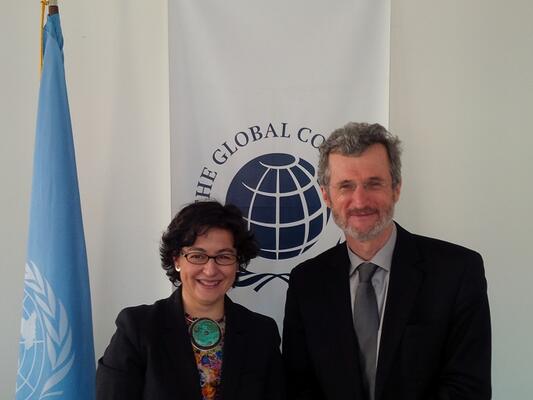
Increasing SMEs’ Contribution to Global Food Security (en)
(New York and Geneva, 9 March 2015) – The UN Global Compact (UNGC) and the International Trade Centre (ITC) together aim to bolster the competitiveness of small and medium-sized agribusinesses, enabling them to better contribute to global food security while making production more environmentally and socially sustainable.
Meeting in New York today, ITC Executive Director Arancha González and UN Global Compact Executive Director Georg Kell agreed that ITC would leverage its Standards Map tool and Trade for Sustainable Development (T4SD) platform to disseminate the UNGC Food and Agriculture Business (FAB) Principles among small farmers and small and medium-sized enterprises (SMEs) in the agribusinesses sector.
‘ITC plays a critical role in enabling SME competitiveness globally’, said the UN Global Compact’s Kell. ‘We welcome their initiative to leverage the FAB Principles on the Standards Map, especially to enable SME agribusiness to contribute to ending hunger and achieving food security by improving nutrition and promoting sustainable agriculture.’
The UN Global Compact facilitated development of the FAB Principles through a two-year global and inclusive multi-stakeholder process including more than 1,000 businesses, UN agencies and civil society organizations involved in agriculture, nutrition and food systems.
Launched last September, the six FAB Principles set out how business can help meet the challenge of feeding the world’s growing population while simultaneously reducing the environmental footprint of agricultural production and generating decent work for farming communities. The Principles urge businesses to aim for food security and nutrition; to be environmentally responsible; to respect the rights of farmers, workers and consumers; to respect land and resource rights; and to invest in new technologies and developing the capacities of smallholders and SMEs.
Intended to serve as a framework for companies to cooperate with the UN, governments, civil society, and other stakeholders, the FAB Principles complement existing initiatives that advance sustainability in food and agriculture. They serve as an umbrella over voluntary standards and technical compliance platforms, such as those referenced on the ITC Standards Map.
‘The UN Global Compact’s FAB Principles are the essence of how responsible agribusiness should operate and successfully partner with governments, NGOs and stakeholders’, said ITC’s González. ‘With the UNGC framework small famers and SMEs can make a principle-based commitment regardless of size, crop or location, and whether they are beginning or continuing their journey toward sustainability.’
The ITC Standards Map provides comprehensive and comparative information on over 150 sustainability standards and codes of conduct, including many that are relevant in the farm sector, with the goal of strengthening the capacity of producers, exporters, policymakers and buyers to participate in more sustainable production and trade.
Together, the FAB Principles and the Standards Map offer food and agriculture businesses a way first to make a commitment to sustainability and then to measurably follow through on that commitment.
About the United Nations Global Compact
Launched in 2000, the United Nations Global Compact is both a policy platform and a practical framework for companies that are committed to sustainability and responsible business practices. As a multi-stakeholder leadership initiative, it seeks to align business operations and strategies with ten universally accepted principles in the areas of human rights, labour, environment and anti-corruption, and to catalyze actions in support of broader UN goals. With 8,000 corporate signatories in 145 countries, it is the world’s largest voluntary corporate sustainability initiative.
www.unglobalcompact.org
About the International Trade Centre
ITC is the joint agency of the World Trade Organization and the United Nations. ITC assists small and medium-sized enterprises in developing and transition economies to become more competitive in global markets, thereby contributing to sustainable economic development within the frameworks of the Aid-for-Trade agenda and the Millennium Development Goals.
www.intracen.org



